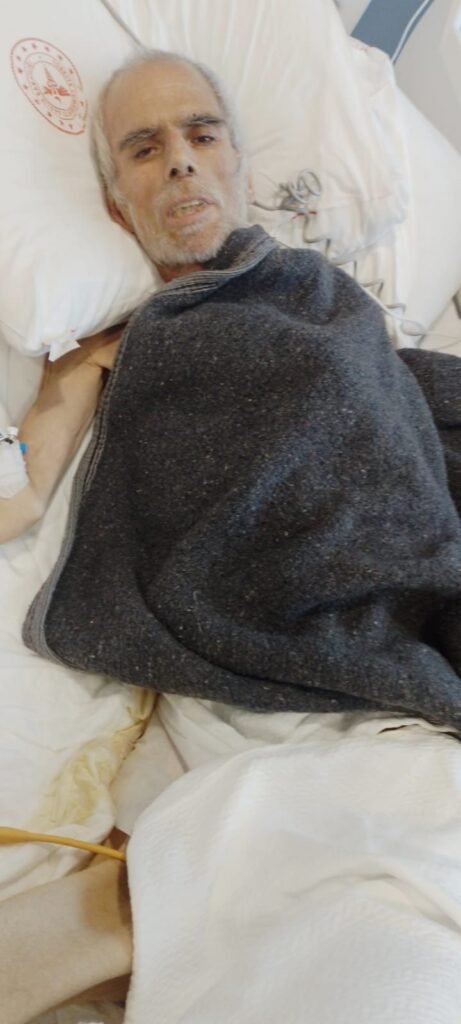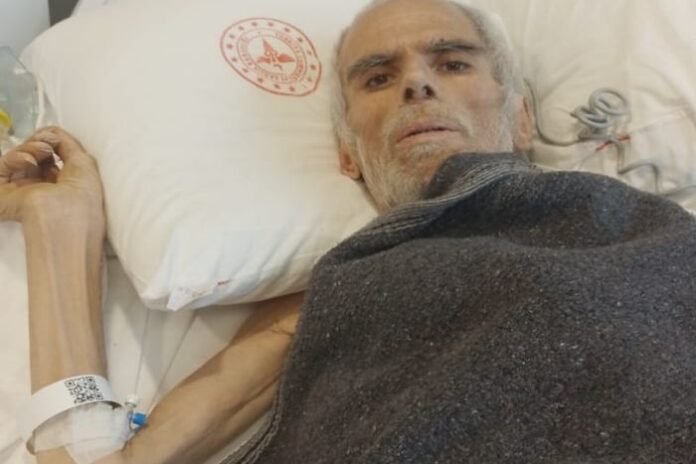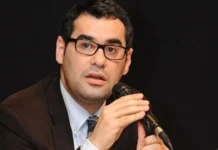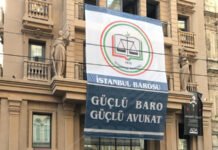A Turkish lawyer suffering from late-stage cancer who lost his leg after receiving delayed medical treatment in prison was released on medical grounds this week, but his family said the decision came too late and that his condition is now life-threatening, the TR724 news website reported.
Süleyman Yıldırım, 57, who had been admitted to İzmir Şehir Hospital last week, was discharged Monday evening and taken home after receiving a three-month suspension of sentence from Turkey’s Council of Forensic Medicine (ATK).
The ATK frequently comes under criticism over its questionable reports that find ailing inmates fit to remain in prison. Rights advocates slam the agency over its lack of independence from political influence and its role in compounding the persecution of political prisoners.
According to his family, doctors have said a tumor in Yıldırım’s lung is now too large to be surgically removed.
“He weighs just 40 kilos,” a family member said. “He was left without proper treatment in prison. Even in the hospital, no real care was given. He is at death’s door.”
A coalition of 17 international legal and human rights organizations issued a joint statement in early October urging Turkish authorities to suspend Yıldırım’s sentence and release him for medical treatment. The call came after his left leg was amputated, an outcome the groups attributed to prolonged delays in care while in custody.
In a separate letter in October the German Bar Association (DAV) also appealed for his immediate release, warning that continued detention under such conditions violated fundamental human rights and international legal standards.
Despite these appeals and multiple medical reports declaring him unfit for custody, authorities delayed his release until the end of October.
Human rights lawyer Cemil Çiçek, who had previously raised concerns about the case, shared images of Yıldırım on social media following his release and wrote: “Look at the state he was in when they finally let him go, down to 40 kilos. Stop keeping people with advanced cancer in prison.”

Yıldırım, 56, has been held in Denizli T-Type Prison since July 27, when he was arrested while receiving treatment at a local hospital. For nearly two months, he received no medical care in prison, his lawyers say. On September 6 his condition became critical, and he was admitted to the intensive care unit of Denizli State Hospital, where he underwent heart surgery and later suffered a blood clot and also had his left leg amputated below the knee due to circulation complications. Doctors warned that fluid buildup in his lungs might point to cancer. He remained in intensive care for nearly three weeks.
Physicians at the hospital issued a report stating that Yıldırım “cannot stay in prison” and “cannot travel even for medical checkups.” They warned that his condition is “very serious” and carries a high risk of death. Despite this, the Council of Forensic Medicine (ATK) in Istanbul summoned him to appear in person as part of its review of his request to suspend his sentence for medical treatment.
According to Law No. 5275, the sentence of a prisoner who, due to a serious illness or disability, is unable to manage life on their own under prison conditions and who is not considered a serious or concrete danger to society, may be suspended until they recover. However, the stipulated suspension of the sentence is often not implemented.
Yıldırım, a father of five, has practiced law in Denizli since graduating from Dokuz Eylül University in 1991. He was first arrested in the aftermath of a failed coup in July 2016 and sentenced to more than six years in prison on alleged links to the faith-based Gülen movement. The court cited his use of the encrypted messaging app ByLock, deposits made in Bank Asya, a shuttered bank linked to the group, and his children’s enrollment in schools later closed by emergency decree.
Turkish President Recep Tayyip Erdoğan has been targeting followers of the Gülen movement, inspired by the late Turkish Muslim cleric Fethullah Gülen, since the corruption investigations of December 17-25, 2013, which implicated then-prime minister Erdoğan, his family members and inner circle.
Dismissing the investigations as a Gülenist coup and a conspiracy against his government, Erdoğan began to target the movement’s members. He designated the movement as a terrorist organization in May 2016 and intensified the crackdown on it following an abortive putsch in July of the same year that he accused Gülen of masterminding. The movement strongly denies involvement in the coup attempt or any terrorist activity.
Since the coup attempt, the Turkish government has accepted such activities as having an account at now-shuttered Bank Asya, one of Turkey’s largest commercial banks at the time; using the ByLock messaging application, an encrypted messaging app that was available on Apple’s App Store and Google Play; and subscribing to the now-shut-down Zaman daily or other publications affiliated with members of the movement as benchmarks for identifying and arresting alleged followers of the Gülen movement on charges of membership in a terrorist organization.
Yıldırım served 10 months in prison before being released while his appeal was under consideration, but Turkey’s top appeals court upheld his conviction this year, leading to his re-arrest on July 27.
The Human Rights Association (İHD) says more than 1,400 sick prisoners are currently held in Turkey, including hundreds in critical condition. Complaints include delays in taking inmates to hospitals, inadequate treatment in prison infirmaries and forensic reports that allow seriously ill detainees to remain incarcerated.
Turkey recorded 709 deaths in prison in the first 11 months of 2024, according to data from the Ministry of Justice shared in response to a parliamentary inquiry.















